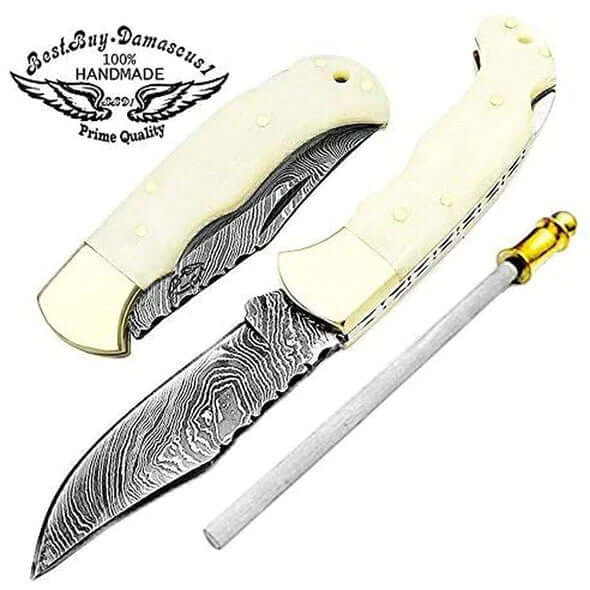
The Pros and Cons of a Knife Collection
Posted by Best.Buy. Damascus1 on
About Knife Collecting
There are many art knives that could be great additions to a collection. Many of them increase or maintain their value over the years, making collectible knives something that can be passed on to the next generation of collectors. Some people collect art knives for profit, but many start collecting what they like without even knowing the history. Don't buy knives that are damaged or in poor condition unless they are very old and rare - or you have fallen in love with their craftsmanship. After all, the first and foremost thing about collecting is your satisfaction.
The Pros of Knife Collecting
Knife collecting has the following positive aspects:
Knives have a rich history. There is no collector who would not like to know more about the weapons in their collection. The more knives you collect, the more you learn about them. This increases your knowledge and you will soon become a master of the art. By accumulating knowledge, you not only get the opportunity to teach other people, but also to make wiser decisions when making future purchases.
Knife collecting is an exciting way to spend your free time. Psychologists have shown that having a hobby makes you feel more important and more intelligent.
Collecting knives is a good opportunity to leave an imprint of yourself on other people's memories. We all want to be remembered when we are gone. In most cases, people are remembered for what they have done. As a collector of knives, you will leave them as a memento for your children. It is very important to pass on information to children about the historical value of the collection and its cost - so that in the future they can sell it, preserve it or pass it on to a local museum.
Knife collections can be profitable. There are always people interested in collecting knives. As we know, the value of antiques increases over time. This means that if you do not want to keep your collectible knives, you can always sell them at a higher price than you bought them. You can earn money for a trip or use it to buy a new knife collection. Great, isn't it? Many collectors assume that they will eventually sell their knives and may even want to make a living from the hobby.
Cons of Knife Collecting
Like any hobby, a new knife collection can bring negative aspects into your life. Some of these disadvantages include:
When you buy your first knife, you will get absorbed and your collection will grow. Sometimes collections can get out of control and you may spend more money than you planned. This can lead to bad situations, especially if you don't have spare money for knife collecting.
Knives can cause injuries. As art knives are weapons, they can easily injure people around them. You may have young children who think of your knives as toys. It is advisable to keep your knives in a safe place out of the reach of children.
The knives may not be original and the collection will become cheaper. There are many original antique knives that you can collect, but like any other industry, there are unscrupulous people who may try to sell counterfeit antique knives. If you fall into their trap, you will lose money. But this can be overcome with a minimum of research and by finding a reliable source. The key to success in this hobby is research. Make sure that the custom knife you buy is original and of good quality, before you buy.
How to Store Your Knife Collection
Wooden knife blocks seem like a good idea for storing a large collection of knives. They keep your knives safe and look great on the worktop. When buying wooden products, many people feel they have bought something sustainable and healthy. Knife blocks come in all shapes and sizes, usually made from a solid block of wood with angled slots large enough to accommodate different types of collectibles. But despite their convenience and the fact that they are designed purely for organizing collections, they are actually not that good. Here's why knife blocks do more harm than good:
A marketing ploy by sellers. Most people buy a block when they buy the first knife in their collection. But most of them find that they don't need this storage element at first because their knife collection is still too small. Therefore, you should not pay for additional services that you will never use and never need if you give up your hobby.
All knives dull over time - it happens all the time. But if you run the blade over a hard surface, it will speed up the process. This happens when you insert the knife into the knife block. This sliding process, as well as the insertion of the blade inside the groove, chips the blade as fast as it is used in the kitchen. The blade can become dull after 70 impacts in the knife block.
3 - The neighbourhood is full of germs. These deep, dark crevices are a perfect breeding ground for bacteria and mould. Dust and debris can easily accumulate in these areas. So, every time a knife slips out, there is a risk of infection. If this does not convince you to give up the collection unit, clean it at least every month: shake out the debris, then clean the inside with an antiseptic and make sure it is completely dry before sliding the knives in.

